In a street café in Prague’s Old Town, 24-year-old Colin Farrell is having a coffee with Bruce Willis. It’s a few days before they face up as adversaries in Hart’s War, a war drama that Gregory Hoblitt, who also directed Primal Fear and Frequency, is shooting on location in the wooded hills outside the Czech capital. The former Communist bloc country is now a little Hollywood, its low costs attracting a flood of American movie productions.
The actual setting for Hart’s War is a German POW camp in the Ardennes in Belgium in December 1944. “It’s three months after the D-Day landings and a few months before the end of World War Two,” says Farrell. “I’m a second-year law student from Yale defending a black guy who’s accused of murdering a fellow American. The Germans let the court martial go ahead because they think it might be entertaining to see their American prisoners making fools of themselves.
“There’s a lot of back-stabbing going on. Bruce is kind of behind some of the wrong-doing. His attitude is that one prisoner has to be sacrificed for the good of the others. For much of the movie I go toe to toe with him.”
Director Gregory Hoblitt had flown to Texas where Farrell was filming the lead role of Jesse James in Les Mayfield’s American Outlaws (on release this August) to court the black-haired young Dubliner for the role. “We got on right away. He was cool,” recalls Farrell, who made his name in Ireland as the pony boy in the popular television series Ballykissangel, and became known to American audiences in Joel Schumacher’s Tigerland, which opened last October to rave reviews.
Farrell’s electrifying portrayal of a rookie who becomes the leader of a bunch of recruits in a boot camp at the height of the Vietnam War prompted critics to tip him as a possible Oscar contender. He wasn’t nominated, but Steven Spielberg’s recent announcement that he had cast Farrell as Tom Cruise’s brother in Minority Report, a futuristic thriller based on a Philip K. Dick story, has ensured the young Irish actor’s place on the top rungs of the Hollywood ladder.
Minority Report will start shooting in the U.S. immediately after Hart’s War wraps this June.
“Jaysus. It’s getting bleeding crazy,” Farrell says of his overnight star status. “You couldn’t actually give it too much thought or your head would be destroyed.”
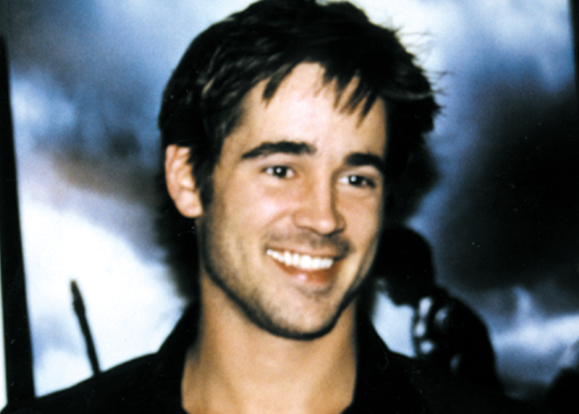
He still can’t believe what has happened to his career. It’s only four years since Farrell made his debut in the Irish TV mini-series Falling For a Dancer, after he had opted out of Dublin’s Gaiety School of Acting. “I didn’t think I should have to pay £2,500 and take a year out of my life to be told that I was crap,” he says.
Indeed. In the past year Vanity Fair dubbed Farrell the Irish Brad Pitt. Harper’s Bazaar predicted he “could be the most irresistible Irish import since Guinness.” Interview featured a bare-chested Farrell on its cover and likened him to James Dean and the early Robert De Niro: “With his carbon looks, glittering eyes and un-showy authority, Colin Farrell blazes. He radiates the kind of romantic fatalism that transcends into the purest kind of cinematic heroism.”
“This guy has the second biggest industry in America wanting him,” says Scottish actor Peter Mullan, currently starring in The Claim, who got to know Farrell when they had supporting roles as Dublin gangsters in Ordinary Decent Criminals. “That’s a scary concept. My worry for him, if I was his da, is that they [Hollywood moguls] can f**k you over big time. But I don’t think it will change Colin. He’s a darling man. He isn’t at all vain. He just wants to give it a go.”
Farrell took some advice from Irish actor Pierce Brosnan about how to navigate the murky waters of movieland.
“He told me to be as bold as possible, to keep it going,” admits Farrell, who, if he hadn’t been an actor, would probably be playing soccer. His father, Eamon Farrell, and uncle, Tommy Farrell, played for Shamrock Rovers in the glory days when the Dublin team was the Manchester United of Irish football. Thirty thousand fans watched them beat Red Star Belgrade in 1961.
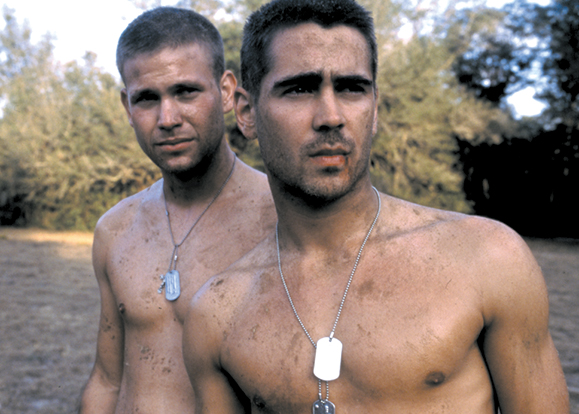
“I kind of saw my life going that way until I was about 14,” says Farrell. “Although I was too young ever to see my dad play, I never missed an Irish international. But I guess I didn’t really want it enough. I had a few cans of beer. There were girls. That was the end of football.”
He gave up on school, too. After three years at Castleknock, where he played rugby (“because they let you get away with murder if you did”), and two years at Gormanstown, he finished up at Bruce college. “That didn’t work out either. I was just too busy messing around. So I took off to Australia when I was 17.”
Farrell hung around The Performance Place on Sydney’s Cleveland Street, where he made his stage debut in a play about the outlaw Ned Kelly. “It was perfect for somebody who’d never done more than `bang-bang you’re dead’ playing cowboys and Indians in the back garden,” he says. “The play was terrible but it was the first time I’d rehearsed with a bunch of actors. And once back in Dublin I decided, feck it, I’ll give acting a go.”
He made his European stage debut playing a teenage autistic boy in Gary Mitchell’s In a Little World of Our Own at London’s Donmar Warehouse.
“It wasn’t exactly Chekhov, but it was great storytelling,” he says.
“It was like a movie on stage. Kevin Spacey came on a night off from his rehearsals for The Iceman Cometh, which was about to open on the West End. We began to hang out. He told me there might be a part for me in Ordinary Decent Criminals, which he was about to film with Thaddeus O’Sullivan. So Thaddeus cast me. I got an American agent, Josh Lieberman. I didn’t realize until I got to L.A. that Lieberman also represented Donald Sutherland, Elizabeth Shue, Cuba Gooding Jr. and Ed Harris.”
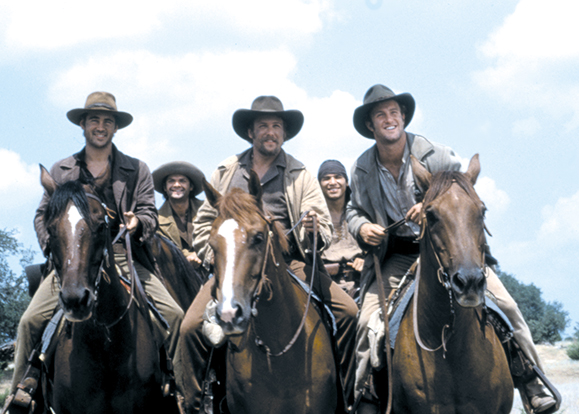
When Farrell was 12 he saw his big sister Catherine – he’s the youngest of a family of four – play Puck in A Midsummer Night’s Dream at the Gaiety School of Acting. “I knew acting was a possibility because she’d done it,” he says. “Catherine and I, more than any of the others, were always into the movies, staying up late as kids watching the old Hollywood black-and-whites.”
Without Catherine, Tigerland mightn’t have happened. Farrell had been late for an audition with veteran director Joel Schumacher, who was in London checking out talent. “I was only five minutes late,” says Farrell, “but the old bastard had his coat on and was going out shopping. He’d seen about 30 or 40 guys and he’d had enough. We talked for maybe four minutes. I thought, well, feck that, there’s a plane ticket wasted.”
Schumacher remembers it somewhat differently. “Colin just filled the room with humor and charm,” he recalls. “I decided to have him read for the lead in Tigerland.”
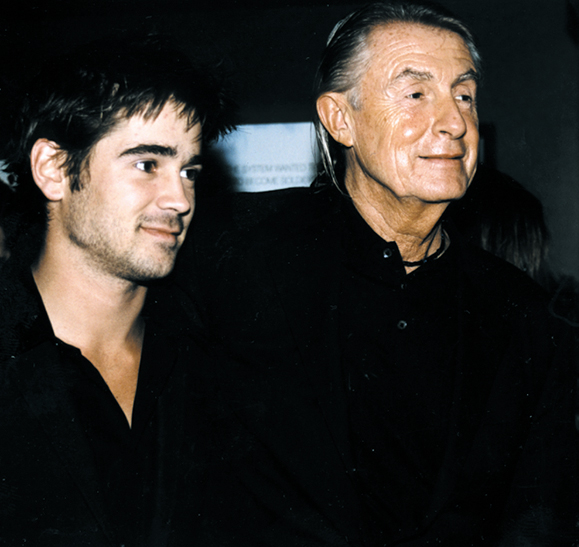
Farrell and Schumacher at the New York premiere of Tigerland. 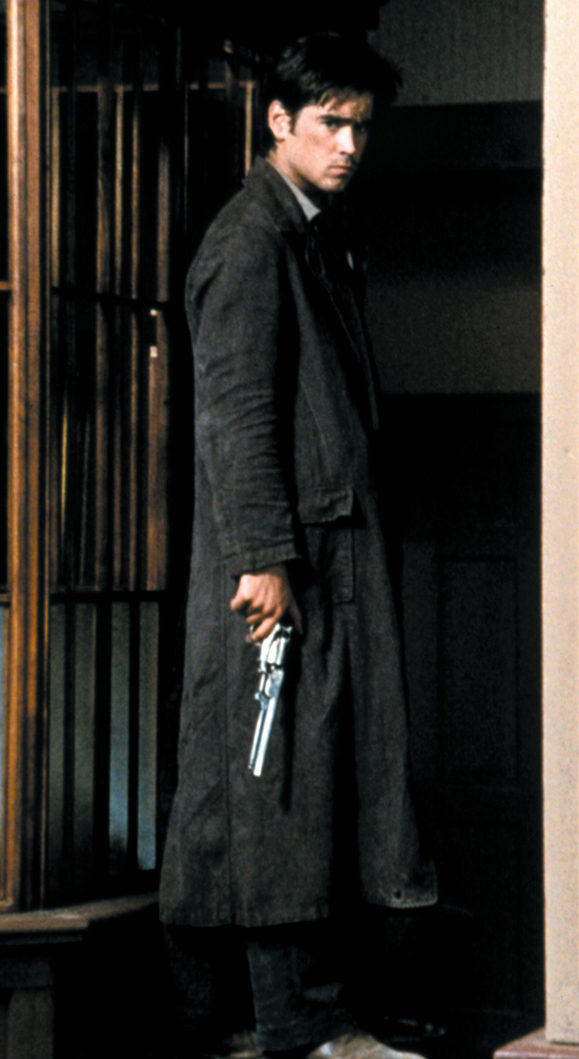
Farrell in American Outlaws.
Catherine filmed her brother in his flat in Irishtown. “She’s very good with a camcorder,” he says. “It was the most crucial few minutes I’ll probably ever do on film.”
Schumacher watched the clip back in L.A. and promptly offered Farrell the lead role of Bozz, a rebellious Texan loner who stands up to his drill sergeant. “Colin reminded me of Paul Newman in Cool Hand Luke, or Jack Nicholson in One Flew Over the Cuckoo’s Nest,” says Schumacher.
Farrell wasn’t bothered by having to talk American. “I grew up on The A-Team and all those TV shows,” he says. “Any star I watched was American. I’d been talking American in my subconscious since I was a kid.”
Tigerland is a revolutionary break-through in Hollywood filmmaking. After Batman and Robin, Schumacher was eager to get away from summer block-buster movies. He’d met director Lars von Trier, propagator of the no-frills, back-to-basics `Dogma 98′ filmmaking style in Denmark.
“Joel was just looking for a vehicle with which he could adopt their philosophy,” says Farrell. “He felt that box-office had become more important than film in Hollywood. Tigerland was perfect for him. He saw he could shoot it on a low budget with unknown actors and he could shoot it in sequence because it would be on one location. It was just about a bunch of lads. Joel shot it almost like a documentary, with hand-held cameras and no makeup. Instead of playing to the camera, he let the camera find out what was going on through the characters.”
While he was still shooting Tigerland, Schumacher cast Farrell in the claustrophobic suspense thriller Phone Booth. “I’m in a phone booth in downtown L.A., gripping a receiver to my ear,” says Farrell, explaining his role. “At the other end of the line there’s a rooftop sniper who has me in his sights. If I hang up, he’ll kill me. The cops have come because he’s killed someone outside the booth. They think I’m the killer, and if I don’t come out, they’ll kill me.”
An entire block had to be cleared last December for the shoot, which was filmed in sequence with four cameras running all the time and had to be completed in 12 days. Forrest Whitaker is the cop who attempts to deal with Farrell. “He’s a lovely man to work with,” says Farrell. “You just have to look into his eyes and you get whatever you need for a scene.”
Immediately afterwards, Farrell moved to Austin, Texas for American Outlaws. “It was a complete change,” he says. “I had to get over all the seriousness of Tigerland, where I was trying to find `the truth.’
“American Outlaws is a romantic-action-adventure comedy. Jesse James is a character I’ve been playing since I was two. It was great craic. I’d done a bit of bare-back riding when I was playing Danny in Ballykissangel, but nothing like this. All I had to do in Ballykissangel was trot two yards, get into the shot and get off. American Outlaws was the real stuff.”
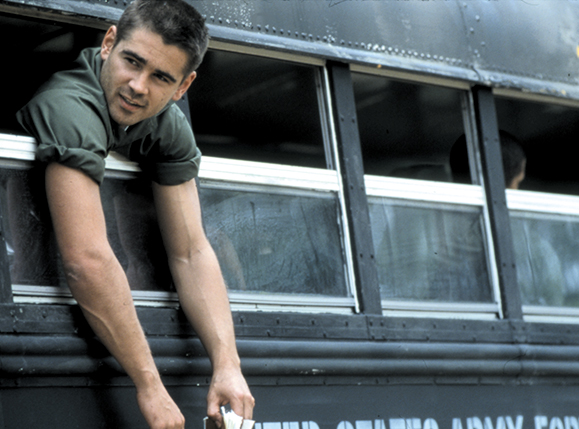
His sister Catherine joined him in Austin. “It’s great having her around,” he says. “She goes on all my shoots now. And we loved Austin. There’s a lovely energy about it, a great music scene, loads of students.” Robin Tunney, currently starring in Vertical Limit, remembers meeting Farrell there. “I got to know him through Josh Lieberman, who’s also my agent,” she says. “Colin is great because he isn’t interested in impressing people. He’s just who he is, a real Dubliner. I hadn’t met Catherine until then. She’s just as beautiful, a gorgeous woman. Now she has her own agent. So there’s another Farrell on the way.”
For Farrell, home is still his small flat near Sandymount strand in Dublin. “There are a few nice pubs around the corner, and a chipper [fish and chip shop],” he says. “That’s all I need. I don’t have a toothbrush or a pair of slippers in L.A.”
He pads across the wooden floor, barefoot. “I’ve been lucky,” he says. “I’ve skipped about 100 rungs on the ladder. So I don’t have to go and live in L.A. or do the scene there to get noticed. I can go there, do the work and get out.
“I’m in no hurry to get anywhere. I don’t have any plans. I don’t have a map. If you did in this business, you’d destroy yourself.” ♦

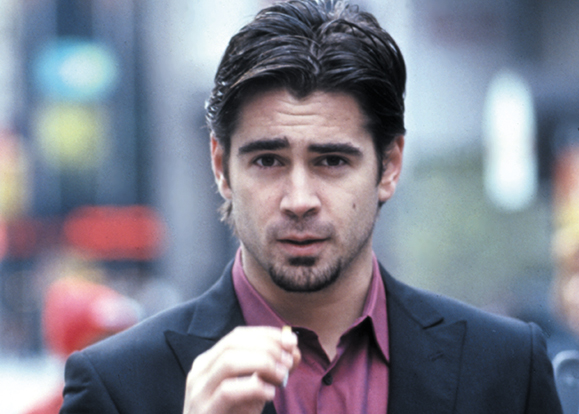
Colin Farrell is a great actor, really love the movie The Gentlemen!
Colin is my all time favorite actor.
Really enjoyed reading this! Colin sounds like such an interesting and multi-talented person — looking forward to learning more!
I loved learning more about Colin. It’s always inspiring to see someone so passionate and authentic. I’m looking forward to seeing what he does next.
Colin Farrell is a great actor, really love the movie The Gentlemen!